This article needs additional citations for verification .(December 2014) |

The Liechtensteinische Landesbibliothek (in English: Liechtenstein State Library) is the legal deposit and copyright library for Liechtenstein.
This article needs additional citations for verification .(December 2014) |

The Liechtensteinische Landesbibliothek (in English: Liechtenstein State Library) is the legal deposit and copyright library for Liechtenstein.
The Liechtenstein State Library, locally known as the State Library, was established by law in 1961 by the National Library Foundation. The State Library possesses a legal depository. Aside from forming the library itself, the National Library Foundation also provides librarians’ commissions. The governing board members are appointed by the national government, which also acts as the supervisory body of the Foundation. The State Teachers Library, founded in 1906, was incorporated as a separate department via elected decision by the teachers’ conference three-member Commission and also by the State Board of Education. The Office of the Librarian, which governs the National Library Foundation, amended the statutes for the separation. The amended statutes changed the roles of the State Library; it now functions as a national library as well as a scientific and public library. As a national library, the State Library collects print materials, pictures and music created by national citizens, as well as items related to Liechtenstein. The State Library also acts as a patent library for Liechtenstein and as such provides access to comprehensive international patent information. The State Library's rules and regulations must follow the current legislation under Liechtenstein's European Economic Area as well as Swiss legislation. [1]
As of 2012, the State Library contained about 250,000 items, with nearly 130,000 loans out to 3,956 library patrons. 2,524 of these patrons are from Liechtenstein and 1,432 people are from the local region. In 1999, the State Library's online library system joined with Ex Libris’ Aleph 500. This automated tracking system provides the library catalogues for every public library in and outside of the Liechtenstein region. The State Library is an associate member of the Information Network of German Switzerland. In addition, the State Library is participating in the Dandelon.com project, [2] in which the Liechtenstein State Library is scanning their materials for online access; this also includes materials which the University of Liechtenstein donated to the library in 2003.
In August 2012 the State Library mounted Project eLiechtensteinesia, which provides online access to scans of the Yearbook of the Historical Society for the Principality of Liechtenstein, old national newspapers, and other publications from Liechtenstein. [1]

A public library is a library, most often a lending library, that is accessible by the general public and is usually funded from public sources, such as taxes. It is operated by librarians and library paraprofessionals, who are also civil servants.

Digitization is the process of converting information into a digital format. The result is the representation of an object, image, sound, document, or signal obtained by generating a series of numbers that describe a discrete set of points or samples. The result is called digital representation or, more specifically, a digital image, for the object, and digital form, for the signal. In modern practice, the digitized data is in the form of binary numbers, which facilitates processing by digital computers and other operations, but digitizing simply means "the conversion of analog source material into a numerical format"; the decimal or any other number system can be used instead.
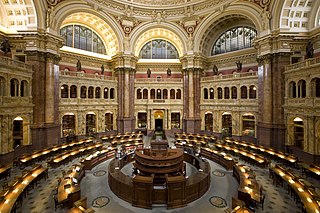
A research library is a library that contains an in-depth collection of material on one or several subjects. A research library will generally include an in-depth selection of materials on a particular topic or set of topics and contain primary sources as well as secondary sources. Research libraries are established to meet research needs and, as such, are stocked with authentic materials with quality content. Research libraries are typically attached to academic or research institutions that specialize in that topic and serve members of that institution. Large university libraries are considered research libraries, and often contain many specialized branch research libraries. The libraries provide research materials for students and staff of these organizations to use and can also publish and carry literature produced by these institutions and make them available to others. Research libraries could also be accessible to members of the public who wish to gain in-depth knowledge on that particular topic.

Legal deposit is a legal requirement that a person or group submit copies of their publications to a repository, usually a library. The number of copies required varies from country to country. Typically, the national library is the primary repository of these copies. In some countries there is also a legal deposit requirement placed on the government, and it is required to send copies of documents to publicly accessible libraries.

The Cleveland Public Library is a public library system in Cleveland, Ohio. Founded in 1869, it had a circulation of 3.5 million items in 2020. It operates the Main Library on Superior Avenue in downtown Cleveland, 27 branches throughout the city, a mobile library, a Public Administration Library in City Hall, and the Ohio Library for the Blind and Physically Disabled. The library replaced the State Library of Ohio as the location for the Ohio Center for the Book in 2003.

HeinOnline (HOL) is a commercial internet database service launched in 2000 by William S. Hein & Co., a Buffalo, New York publisher specializing in legal materials. The company was founded in Buffalo, New York, in 1961, and is currently based in nearby Getzville, New York. In 2013, WSH Co. was the 33rd largest private company in western New York, with revenues of around $33 million and more than seventy employees.
Citation of United Kingdom legislation includes the systems used for legislation passed by devolved parliaments and assemblies, for secondary legislation, and for prerogative instruments. It is relatively complex both due to the different sources of legislation in the United Kingdom, and because of the different histories of the constituent countries of the United Kingdom.
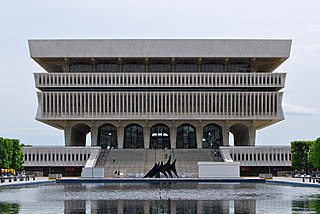
The New York State Library is a research library in Albany, New York, United States. It was established in 1818 to serve the state government of New York and is part of the New York State Education Department. The library is one of the largest in the world by number of items held, with over 20 million cataloged items in 2011.
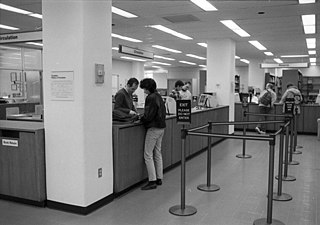
Library circulation or library lending comprises the activities around the lending of library books and other material to users of a lending library. A circulation or lending department is one of the key departments of a library.
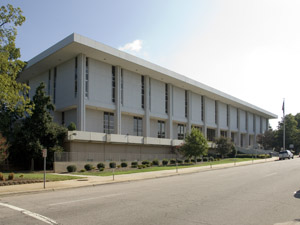
The State Library of North Carolina is an institution which serves North Carolina libraries, state government employees, genealogists, and the citizens of North Carolina. The library is the main depository for North Carolina state publications and serves the needs of North Carolina government agencies and state government employees by providing access to information resources that are vital to public decision-making and economic development.
legislation.gov.uk, formerly known as the UK Statute Law Database, is the official Web-accessible database of the statute law of the United Kingdom, hosted by The National Archives. Established in the early 2000s, it contains all primary legislation in force since 1267 and all secondary legislation since 1823; it does not include legislation which was fully repealed prior to 1991. The contents have been revised to reflect legislative changes up to 2002, with material that has been amended since 2002 fully updated and searchable.

In conservation, library and archival science, preservation is a set of preventive conservation activities aimed at prolonging the life of a record, book, or object while making as few changes as possible. Preservation activities vary widely and may include monitoring the condition of items, maintaining the temperature and humidity in collection storage areas, writing a plan in case of emergencies, digitizing items, writing relevant metadata, and increasing accessibility. Preservation, in this definition, is practiced in a library or an archive by a conservator, librarian, archivist, or other professional when they perceive a collection or record is in need of maintenance.
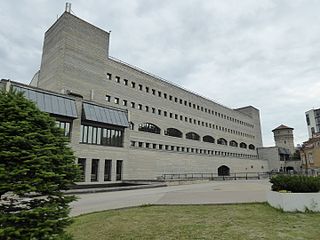
The National Library of Estonia is a national public institution in Estonia, which operates pursuant to the National Library of Estonia Act. It was established as the parliamentary library of Estonia on December 21, 1918.

The Nebraska Library Commission is a Nebraska state government agency. Located in Lincoln, the Library Commission provides reference, resources, training, and consulting for all types of library in the state. The various collections housed at the Library Commission are used to serve librarians, state employees, seekers of government information, and visually handicapped Nebraskans. The Library Commission is a clearinghouse for state government publications and makes many documents accessible online.
The New Jersey Library Association (NJLA) is a library organization located in Bordentown, New Jersey. It was established in 1890, and is the oldest library organization in the State of New Jersey. The NJLA began in 1890 with 39 members, and currently has over 1,700. The organization states on its website that it "Advocates for library services for New Jersey residents; Provides education and networking for library staff;" and "Supports intellectual freedom and access to books, music, movies, and information."
Crown copyright is a type of copyright protection. It subsists in works of the governments of some Commonwealth realms and provides special copyright rules for the Crown, i.e. government departments and (generally) state entities. Each Commonwealth realm has its own Crown copyright regulations. There are therefore no common regulations that apply to all or a number of those countries. There are some considerations being made in Canada, UK, Australia and New Zealand regarding the "reuse of Crown-copyrighted material, through new licences".

A digital library is an online database of digital objects that can include text, still images, audio, video, digital documents, or other digital media formats or a library accessible through the internet. Objects can consist of digitized content like print or photographs, as well as originally produced digital content like word processor files or social media posts. In addition to storing content, digital libraries provide means for organizing, searching, and retrieving the content contained in the collection. Digital libraries can vary immensely in size and scope, and can be maintained by individuals or organizations. The digital content may be stored locally, or accessed remotely via computer networks. These information retrieval systems are able to exchange information with each other through interoperability and sustainability.

Arkansas State Library (ASL) is a special library which operates as a state agency under the Arkansas Department of Education, within the Arkansas state government. It provides information about resources for state agencies, legislators and legislative staff. The library also provides guidance and support for the development of local public libraries and library services. ASL provides resources, services and leadership for the educational, informational and cultural needs of Arkansas citizens.

Public law libraries provide access to primary legal sources and secondary sources used in legal matters. In most U.S. states, public law libraries are part of the trial court system, a department of the state or county government, or an independent local government agency managed by a board of trustees. Public law libraries serve several user groups with different information needs: judges and their support staff, attorneys in all types of practice, and the general public.

The ETH Library, serving as the central university library at ETH Zurich, has a notable collection of scientific and technical information. It is considered one of the largest public scientific and technical libraries in Switzerland. Furthermore, it also offers resources for the public and companies in research and development. Particular emphasis is placed on electronic information for university members and the development of innovative services.
47°08′09″N9°31′15″E / 47.1358°N 9.5208°E